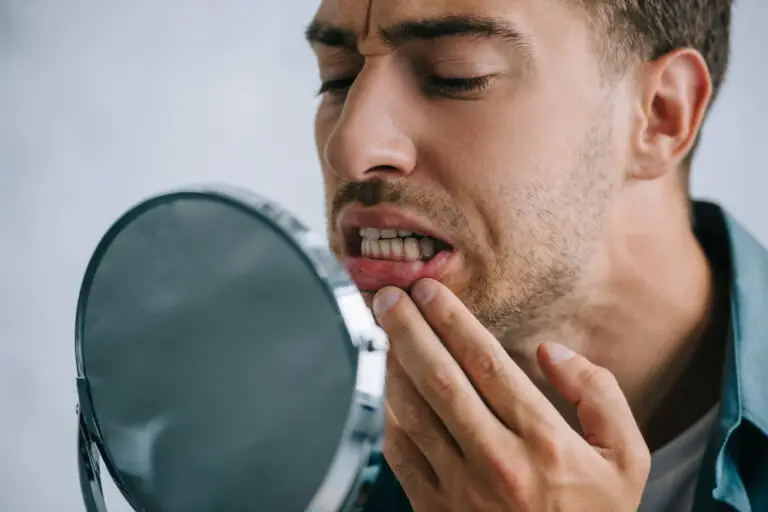A quick search on YouTube will reveal no end of videos of people acting crazy after having their wisdom teeth out, but what is it that causes this behavior? To explain, in this post, we answer the question, what makes you loopy after wisdom teeth removal?
If you want to see some examples of the kind of thing we’re talking about, you can check out this video before reading on!
What Makes You Loopy After Wisdom Teeth Removal?
Wisdom teeth removal – an overview
Before we talk about the kind of medication used during the procedure of wisdom tooth extraction, let’s take a step back and think about what wisdom teeth are and why some people need to have them removed.
Wisdom teeth are the last molars to emerge at the back of our mouths, one on each side on the top and the bottom of the mouth for a total of four.
They don’t usually appear until we are somewhere between 18 years old and in our early twenties, and by that time, all of our other permanent teeth are fully developed.
As a result, sometimes, these teeth don’t have the space they need to grow properly, and they may emerge at unnatural angles relative to the rest of our teeth.
More rarely, they may be impacted, which means they are partially blocked by other teeth that have already grown, so the wisdom teeth won’t be able to fully emerge at all.
In any of these situations, your dentist may recommend that you have your wisdom teeth removed, and this is considered a major procedure that requires varying levels of anesthesia and sedation, depending on the patient.
Different types of anesthetic and sedation
Depending on the patient and also the nature of the surgery, a dentist will decide on which level of anesthesia and sedation to use.
Anesthesia is used to numb the pain while sedation is used both to further reduce the pain and to make the patient feel calmer and more relaxed.
Here are the different levels that are possible:
-
Local anesthetic
Local anesthetic is the minimum level that is used for all wisdom teeth removals.
It involves the dentist injecting a painkiller into the mouth and the gums around the area where the procedure is to be carried out, and this blocks the messages sent from the nerves to the brain, so the patient will be able to feel no pain in that area.
This is also the standard kind of anesthetic that is also used for a whole range of other dental procedures, and it will result in the mouth feeling numb for a couple of hours after the procedure.
However, it will quickly wear off, and this kind of anesthetic won’t cause any kind of loopiness or strange behavior.
For many patients, when the procedure is considered straightforward and there are no complications, this may be the only anesthetic required.
-
Minimal sedation
If the dentist deems the patient needs additional pain relief and also needs something to help them relax, they will be given a kind of light sedation in the form of nitrous oxide.
Nitrous oxide is the gas that’s sometimes also known as laughing gas, and it’s a common sedative that’s long been associated with dental procedures.
Nitrous oxide is breathed in through a mask and helps calm the patient down, making them feel less anxious and more carefree. It also provides a certain amount of relief from pain, although without local anesthetic, nitrous oxide alone would not be enough.
When nitrous oxide is administered, the patient may feel a kind of dreamy light-headedness. However, this will wear off within minutes after the procedure has been completed, so this kind of medication will not usually result in erratic behavior after wisdom teeth removal.
In a clinical setting, nitrous oxide is considered extremely safe.
-
Moderate sedation
If the patient is particularly nervous about the procedure, the dentist may decide to administer moderate sedation, usually in the form of a pill containing a type of benzodiazepine.
The effects of this kind of medication can last longer, in the region of four to six hours, and it can result in some unusual behavior for a few hours after the procedure has been completed.
For example, patients may experience some short-term memory issues, they may have trouble making decisions, they may feel emotional and they may feel somewhat disoriented.
For this reason, patients should not plan on driving themselves home after the surgery, they should not operate heavy machinery and they should not go back to work right after the procedure has finished.
(In fact, it’s better to take at least a few days off work after wisdom tooth removal to give yourself plenty of time to heal.)
However, the advantage of using this kind of medication is that it leaves the patient in a relaxed and compliant state during the surgery and removes anxiety and stress, making it easier for the dentist to work.
During the procedure, the patient may find themselves drifting in and out of a sleep-like state, but it’s also easy to wake them up in an emergency.
-
Deep sedation
When deeper sedation is required, a higher dose of benzodiazepine or an opioid is used.
This will leave the patient practically unconscious, and it is unlikely they will have much recollection of the procedure afterwards.
This kind of sedation is used when patients are considered high-risk or when they are particularly worried about the procedure and need something more extreme to calm them down. It is also used when the surgery is expected to take longer than usual.
The drugs for this kind of procedure will usually be administered intravenously, and when the patient awakes, it is likely that they will feel some disorientation and may display some erratic behavior for some time after the procedure.
-
General anesthetic
General anesthetic is not commonly used for wisdom tooth removal but may be considered if the procedure is expected to be particularly complex – or if the patient prefers to remain unconscious throughout the procedure.
A specialist anesthetist is required to be present throughout the procedure, which will usually take place in a hospital.
Recovery will usually take place in the hospital to monitor for any complications.
The patient won’t usually feel “loopy” in the same way as if they had been given benzodiazepine or opioids, but they are likely to feel “out of it” for at least several hours after regaining consciousness.
Why does it make you loopy?
Patients most commonly feel and act loopy after wisdom tooth removal when they have been given a benzodiazepine sedative.
These drugs not only suppress the central nervous system but also alter the brain chemistry, which can cause symptoms including disorientation and some strange behavior.
People have been known to experience drowsiness and confusion, to act with reduced inhibitions and to say things they probably shouldn’t.
There’s no shortage of videos of examples of this online, and it can seem quite amusing – but it’s best to get someone you trust to take care of you after the procedure since you can’t predict how you will react.
How long will the effects last?
In general, the loopiness will wear off within a couple of hours, so by the time somebody has driven you home and helped you get comfortable in your bed or on the couch, you should start to feel – and behave – normally again.
However, it is also possible to suffer from a form of delirium after wisdom tooth removal due to the same drugs that are used.
In this case, it may take a full day or two before you feel yourself again, and you may experience feelings of confusion and an inability to think clearly during this time.
However, this is much more common in older patients, and since most people have their wisdom teeth out when they are much younger, this kind of reaction is not very often encountered.
Tips for recovering from the side-effects
Ask someone you trust to look after you
Before having your wisdom teeth removed, make sure you find a trusted friend or family member who can take you home and look after you after the procedure.
Remember, you may do or say some slightly embarrassing things after the operation, so it should be someone who you feel totally comfortable with.
Don’t expect to drive home after surgery
Your friend or family member should also be the one who drives you home after the procedure – you shouldn’t try to drive yourself.
In fact, it’s far better not to drive at all for at least two days after wisdom tooth removal, just to be safe.
Plan to relax and recover after the procedure
For the rest of the day, your only plan should be to relax and recover. Stake out a spot on the couch, hide under the duvet, put on a movie or your favorite series and don’t count on moving.
Also, make sure you have some suitable foods like smooth soup to eat for the next day or two.
Don’t make any important decisions in the two days following the procedure
You will not be thinking clearly, so don’t plan on making any major decisions or signing any legally binding contracts or other documents for at least two days after the procedure.
Various drugs used for anesthesia and sedation can have side effects
As we’ve seen, the various drugs used for pain relief and anxiety control used during wisdom tooth removal can result in some erratic behavior in the hours after the procedure has ended.
As a result, you should make sure you find someone you trust to look after you once the procedure is over – and you should also probably ask them nicely not to film you!







